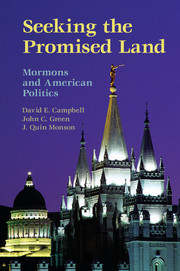Book contents
- Frontmatter
- Dedication
- Contents
- Preface
- Acknowledgments
- Part I Mormons as an Ethno-Religious Group
- Part II Political Behavior of Mormons
- Part III The Consequences of Distinctiveness
- 7 Assessing the Saints
- 8 A Stained-Glass Ceiling?
- 9 How Mormonism Affected Mitt; How Mitt Affected Mormonism
- 10 Seeking the Promised Land
- Data Appendix
- Bibliography
- Index
10 - Seeking the Promised Land
Published online by Cambridge University Press: 05 August 2014
- Frontmatter
- Dedication
- Contents
- Preface
- Acknowledgments
- Part I Mormons as an Ethno-Religious Group
- Part II Political Behavior of Mormons
- Part III The Consequences of Distinctiveness
- 7 Assessing the Saints
- 8 A Stained-Glass Ceiling?
- 9 How Mormonism Affected Mitt; How Mitt Affected Mormonism
- 10 Seeking the Promised Land
- Data Appendix
- Bibliography
- Index
Summary
Just as the 2012 presidential race was heating up, the Pew Mormons in America Survey found that 68 percent of Mormons thought their fellow Americans did not consider Mormonism “mainstream.” But a nearly identical number, 63 percent, also indicated that their fellow citizens were becoming more accepting of Mormons. And 56 percent of Mormons said Americans were ready to elect a Mormon president. Simultaneously believing that they are viewed with suspicion and that the suspicion is waning reflects the Mormon paradox of being a self-consciously peculiar people who are also quintessential Americans. The belief that full acceptance by society will come one day undoubtedly stems from the optimistic spirit of the proselytizing people Mormons are.
Mormons have long sought their own promised land, where they can be both clearly distinctive and fully at peace with their neighbors. Or, as Mormons themselves often put it, they want to be in the world, not of the world – yet also accepted by the world. They would like to be counted among the “mainstream” faiths, grouped in the public mind with Protestants, Catholics, and Jews rather than, say, Scientologists or Wiccans. Mormons have earned a measure of such acceptance in many other venues, including business, sports, entertainment, literature, and academia. But in a democratic society, a key measure of acceptance is politics – an area that has produced mixed results for the Latter-day Saints. Old secular and religious tensions persist, even with new allies, and a Mormon has yet to break the stained-glass ceiling to win the White House.
- Type
- Chapter
- Information
- Seeking the Promised LandMormons and American Politics, pp. 253 - 264Publisher: Cambridge University PressPrint publication year: 2014



